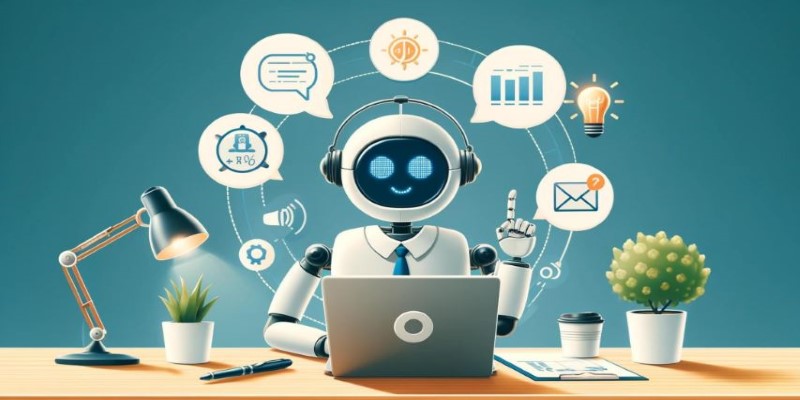The rise of artificial intelligence (AI) has prompted many industries to rethink their future, including accounting. The question, "Will AI replace accountants?" has become a hot topic in recent years as AI technology continues to evolve. With AI becoming increasingly capable of handling complex tasks, many fear that jobs traditionally performed by humans, such as accounting, might be at risk.
However, while AI can automate many aspects of accounting, it is unlikely to fully replace accountants. Instead, AI will more likely become a powerful tool that enhances accountants' roles, allowing them to focus on higher-level tasks that require human judgment.
How AI is Transforming the Accounting Industry?
Artificial intelligence is already making its mark on the accounting industry. From automating basic tasks like data entry to analyzing vast amounts of financial data, AI has revolutionized the way accountants work. AI can process large volumes of financial transactions in a fraction of the time it would take a human, drastically improving efficiency and reducing the risk of human error. This allows accountants to allocate their time to more value-added activities, such as strategic financial planning, advisory services, and decision-making.
AI-based software can also assist in tax preparation, auditing, and compliance. These activities usually involve extensive data and exact calculations, making them perfect for AI usage. For instance, AI can scan previous tax returns and financial statements to determine patterns and check for compliance with evolving tax legislation. Additionally, AI tools can assist with fraud detection by flagging unusual financial activities that may require further investigation.
However, despite these advancements, AI is not capable of performing every aspect of an accountant's job. The human touch is still needed to undertake activities involving critical thinking, creativity, and comprehension of complicated financial situations.
The Limitations of AI in Accounting
Though AI is revolutionizing the accounting job, it nonetheless has its bounds. One such main issue is that AI would not be able to understand the context like humans do. While AI can provide analysis of financial data from history, it could have difficulty gauging the overall economic or social elements impacting a company's bottom line. Accountants bring experience and judgment to make critical decisions based on these elements that AI cannot execute.

Another limitation of AI is its inability to build relationships with clients. Accountants often serve as trusted advisors, providing not only technical expertise but also personalized guidance and strategic advice. This human touch is essential for fostering client relationships and understanding the unique needs of each business. AI, on the other hand, is limited to the information it is programmed with and cannot adapt to the nuances of individual client needs in the same way an accountant can.
Moreover, AI technology is still evolving, and its implementation in accounting can be costly and complex. Small firms or individual accountants may not have the resources or the technical knowledge to invest in AI systems and integrate them into their workflows.
The Role of Accountants in an AI-Powered Future
AI is expected to transform the profession rather than replace accountants. Accountants will still be needed to oversee AI systems, ensure they are functioning properly, and intervene when the technology encounters problems. As AI handles more routine tasks, accountants will have more time to focus on strategic areas of their work, such as advising clients on financial decisions or helping businesses navigate complex tax and regulatory environments.
In an AI-powered future, accountants will need to develop new skills to complement the technology. This includes a deep understanding of how AI works, how to interpret its outputs, and how to apply these insights to drive business success. Accountants will also need to adapt to new tools and workflows, embracing the changes that AI brings while continuing to provide the human judgment and expertise that clients rely on.
Furthermore, as AI automates more of the technical tasks in accounting, the demand for accountants with strong communication, analytical, and problem-solving skills will increase. These skills are critical for explaining complex financial data to clients, interpreting the results of AI-driven analysis, and offering valuable insights based on those results. Accountants will become more like business consultants, providing high-level advisory services rather than simply crunching numbers.
The Future of Accounting with AI
The future of accounting is undoubtedly intertwined with AI, but the profession is not going away. Instead, AI will change how accountants work, making their jobs more efficient, productive, and strategic. As AI continues to evolve, it will handle more of the routine tasks, such as bookkeeping, invoicing, and tax preparation, allowing accountants to focus on more complex and rewarding aspects of their profession.

AI-powered tools will improve efficiency and help accountants provide more personalized and insightful services to clients. For example, AI can help accountants identify emerging financial trends, analyze industry benchmarks, and forecast future performance, all of which can enhance their advice.
Moreover, AI will likely open up new career opportunities within the accounting profession. Accountants with expertise in AI, data analysis, and financial technology will be in high demand as businesses seek professionals who can bridge the gap between traditional accounting and the new wave of technological innovation. The future of accounting is likely to involve a combination of human expertise and AI-driven technology, resulting in a more dynamic and impactful role for accountants.
Conclusion
While AI will significantly transform the accounting profession, it is unlikely to replace accountants entirely. AI will automate routine tasks, improving efficiency, but accountants will still be essential for tasks requiring human judgment, creativity, and client relationships. The future of accounting will involve a collaboration between human expertise and AI, with accountants taking on more strategic roles. By embracing new technology and adapting to the changing landscape, accountants can leverage AI to enhance their services and remain valuable advisors in an increasingly tech-driven world. AI will complement, not replace, the human element in accounting.
